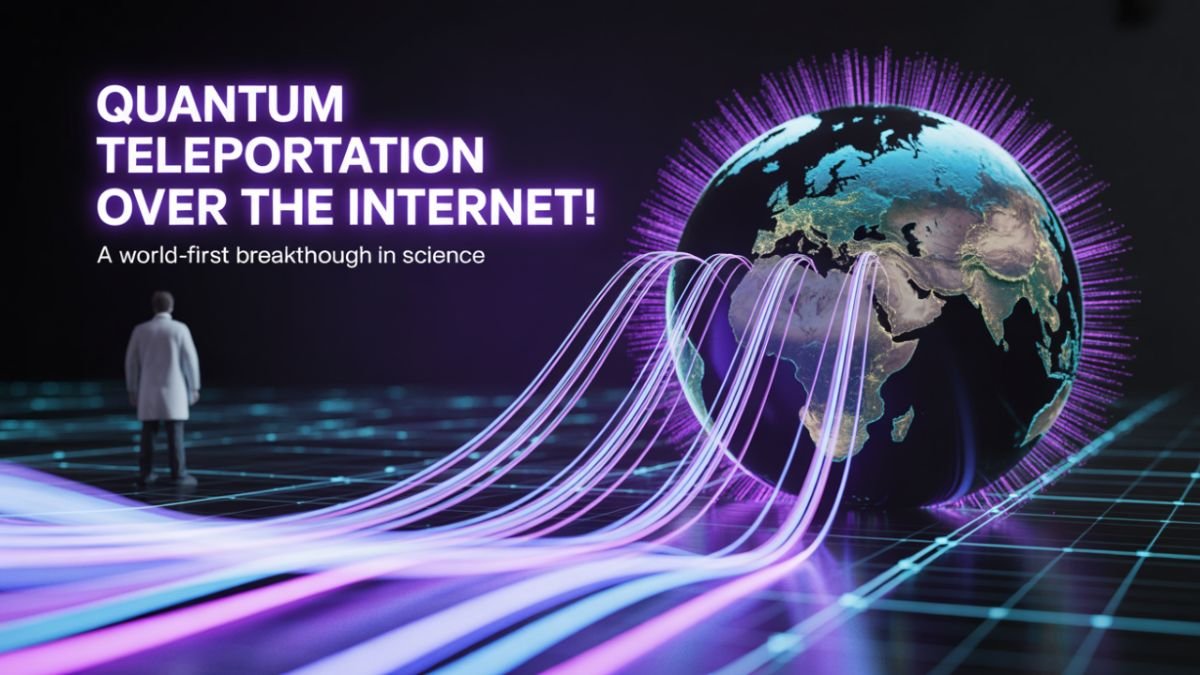Imagine one day you could travel from one city to another in an instant, without actually traveling. It sounds like something out of a science fiction film, but in 2024, scientists have brought this fantasy closer to reality.
Scientists in the United States have successfully teleported a quantum Teleportation state over a 30-kilometer (approximately 18-mile) long fiber optic cable—which was also carrying internet traffic—in a groundbreaking experiment.
This achievement could be a major turning point not only in the world of science but also in future internet, communication, and computing technologies.
What is Quantum Teleportation?
Quantum teleportation doesn’t mean “sending” an object from one place to another but rather “transferring” its quantum state—that is, the pattern of its energy, position, and properties—to another location.
In simple terms, the complete identity of one particle is transferred to an identical particle located elsewhere.
In this process, the original particle is destroyed, but its identity—or its “digital signature,” so to speak—is recreated at the other location.
This process is based on the principle of quantum entanglement, where two particles are linked in such a way that an action performed on one instantly affects the other, even if they are millions of miles apart.
The Historic 2024 Experiment – Quantum Signals Amidst Internet Traffic
A team of scientists from Northwestern University in the United States conducted this remarkable experiment.
The lead scientist, Prem Kumar, explained: “This is incredibly exciting because no one thought it was possible. Our research shows that quantum and classical networks can coexist on the same fiber infrastructure.”
His team successfully transferred the quantum state of a single photon (light particle) even amidst the high-speed data flow of the internet (400 gigabits per second). Imagine, where billions of data packets travel across the internet every second—sending an extremely sensitive quantum signal through the same medium without disturbance is an incredible scientific achievement.
Why is this discovery so important?
This achievement has far-reaching consequences. It could directly revolutionize three major areas:
- Quantum Internet: In the future, the internet will not only exchange information but also communicate quantum states—making data theft or hacking virtually impossible.
- Advanced Encryption: Quantum communication can make data encryption so secure that it would be impossible for even a supercomputer to break it.
- High-Precision Sensing and Monitoring: Using quantum teleportation, it will be possible to measure extremely subtle changes in the environment, health, or space.
How was this experiment conducted?
The researchers used a special technique in fiber optic cables to protect the quantum signal amidst classical internet data (such as bank transactions, videos, and messages).
Prem Kumar explains— “We carefully studied how light scatters and placed our photons at the point where scattering was minimal. This way, we made quantum communication possible even amidst classical channels.”
He also added that their team is the first to have teleported a quantum state with actual internet traffic—all previous experiments were based only on simulations.
Quantum Teleportation vs. Star Trek Teleportation
Many people, upon hearing the word “teleportation,” are reminded of science fiction films—like in Star Trek, where people enter a machine and arrive on another planet.
But real-world quantum teleportation is quite different.
It doesn’t physically transport a person or object but rather transfers its “quantum information.” For example, if you have a photon in quantum state “A,” you can destroy that state and create the same “A” state in another photon—without any physical transport.
The Biggest Challenge: Decoherence
- Quantum states are extremely sensitive.
- They break down at the slightest contact with heat, vibration, or any other energy, a phenomenon called decoherence.
- Protecting your quantum signal among billions of photons in a fiber optic cable is like trying to keep a single drop of water distinct in a waterfall—an almost impossible task.
- But scientists have accomplished this feat using special filters, frequency channeling, and timing techniques.
A New Leap Towards the Future
- This experiment has proven that quantum and classical internet can coexist on the same fiber network.
- This means that in the future, governments or companies won’t need to build new networks—the existing internet infrastructure will be able to handle quantum data as well.
- Prem Kumar says,“If we choose the right wavelengths, we won’t have to build new infrastructure. Both classical and quantum communication are possible simultaneously.”
Quantum Internet—The Future of Data Security
The biggest advantage of the quantum internet will be that no data theft or espionage will be possible.
Because as soon as a third party tries to intercept a quantum signal, its state will instantly change—causing the signal to “self-destruct.”
Similar Discoveries Happening Worldwide
- It’s not just the US; Europe, China, and Japan are also rapidly working towards a quantum internet.
- China has already established a satellite-based quantum communication link, while the European Union has planned a “Quantum Internet Alliance” by 2030.
- Now that the US has proven that quantum signals can be securely transmitted over the existing internet, this competition will only intensify.
Conclusion—The Dawn of a New Digital Revolution
This achievement in 2024 is a milestone in the history of science While it won’t help you “beam me up, Scotty!” to get to the office, it will completely transform the internet of the future Quantum teleportation is no longer just a physics experiment it’s the foundation of the next chapter of the digital age.Where data, communication, security, and computing everything will be secure, faster, and more intelligent at the quantum level.
